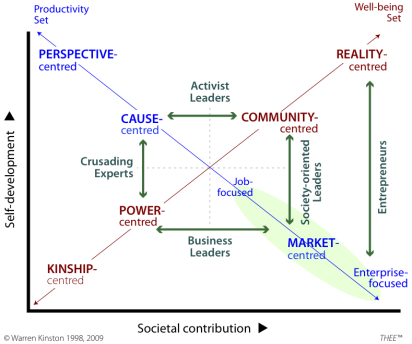
False Negatives 2: Interacting-for-Benefit
R&T identified one sort of as the Expert, and the as the Opportunist.
THEE invites us to consider the leadership potential of the 5 interactional categories that have not been identified by R&T:
■ centred
■ centred
■ centred
■ centred
■ centred
The combination of and mentalities is characteristic of the . Commonly reaching CEO posts in large firms, leaders in this category tend to stick with convention. They are allowed to lobby government and speak for their firm or industry by other CEOs. They regard the use of power as a natural aspect of ensuring profitable business deals.They also use power-based methods to handle people and problems in ways that do not waste their valuable time.
Is Business Leader a Good Name?I think so. It is well -understood. But how much leading they actually do is another matter.
Leaders who are primarily value community life, social groups and wider society. They emphasize cooperation and are particularly antagonistic to power-centred ploys. This mentality aligns rather well with —cf. similar positions in the TET plots.
It is the that shape application of any leadership potential that they may happen to possess.
: Leadership may be shown in a diverse range of organizations targeting social arenas: e.g. running «cooperatives» that compete directly in sectors like banking or retailing; or running enterprises or projects in socially-based sectors like the arts, festivals, education.
: There is a well-recognized category of Social Entrepreneur— it contains leaders who can imaginatively develop viable schemes serving the community. Typically these occur in areas that the relatively unimaginative bottom-line oriented avoid. In some cases, the venture is non-profit and about generating social improvement. However, in many cases the venture is all the stronger due to the expectation of profits.
: Such people become activists and if able enough, seek leadership positions in advocacy groups or charities.
individuals are not natural leaders or even doers. Nevertheless, such persons may reach leadership positions within government bodies where performance is rather bureaucratised and cool balanced judgement is valued above energetic pragmatism.
— those for whom the family and family life is everything are generally unwilling to give the time that leadership positions demand. The only exception is a family business, which may generate intense commitment and become extremely successful.
seems to correspond to R&T's Individualist. Despite the contribution that can be made by such people (clearly evident in the TET), this Type is not strongly leadership-oriented except as an entrepreneur. Read THEE's look at R&T's Individualist.
- Next step: Let THEE loose on R&T's three False Positives.
Last Updated: 12-Jan-2012